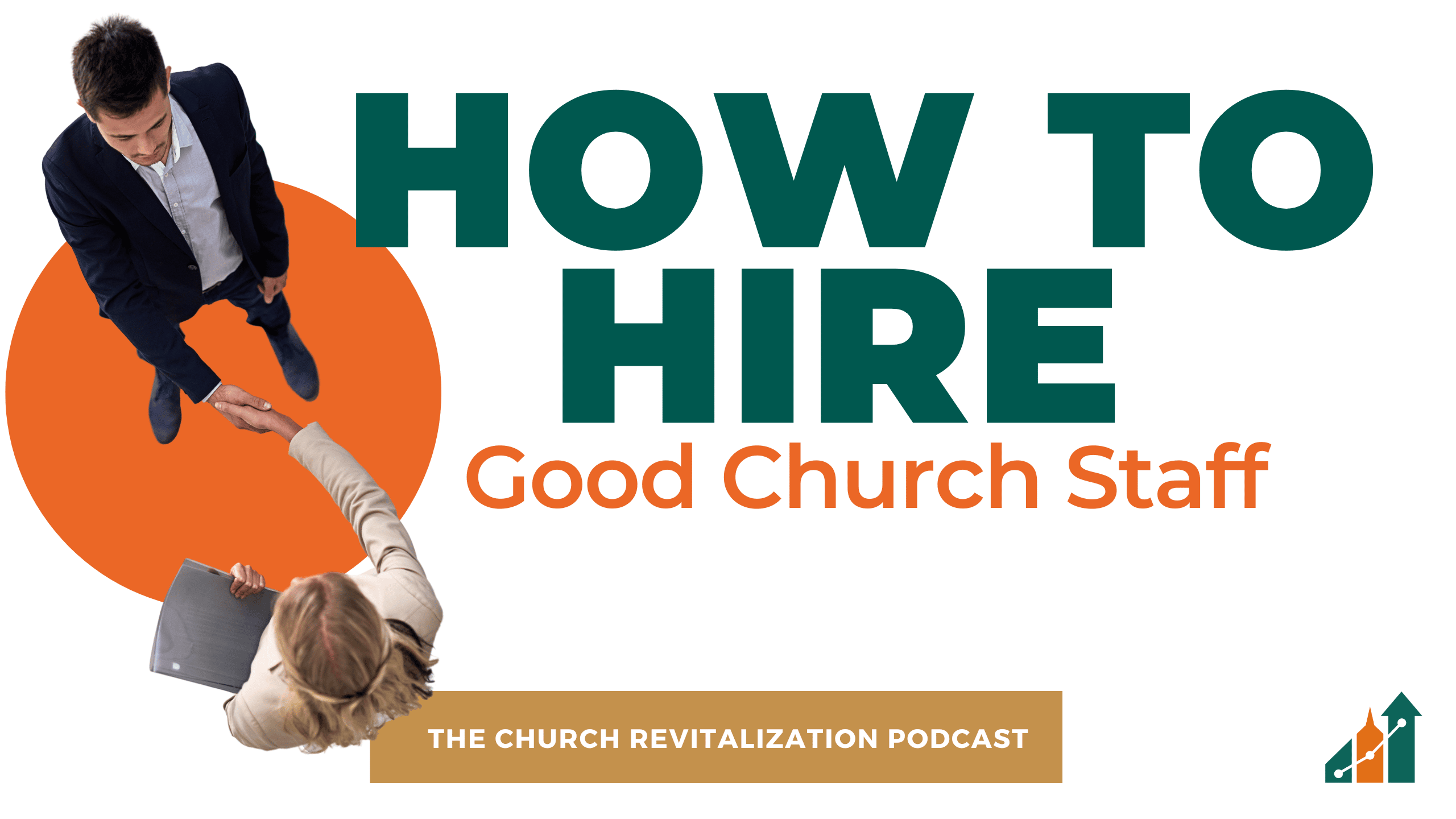The Church Revitalization Podcast – Episode 159
Finding the right candidate for a church staff opening is difficult. Whether you’re trying to find a new senior pastor or a part-time children’s ministry director, the cost of hiring the wrong person is steep.
But most church boards and church leaders aren’t HR experts. They are not used to hiring and firing, and knowing what it takes to find great candidates. Even more, trying to hire good church staff by simply translating best practices from the corporate world can be a disaster. Your church isn’t a business. Therefore finding a good church staff member is different from finding a good corporate candidate.
Getting the right hire doesn’t need to be impossible. There are some key principles that your church can apply to be sure you’re pulling from the best pool of candidates, identifying critical characteristics, and ensuring that you eliminate the wrong candidates from your search process. Let’s get into the details and dive into how to hire good church staff.
Subscribe below to never miss an episode.
Get Out of the Pool of Recycled Resumés
A general listing on your denomination’s job board–or even a large national job board–can yield mixed results. You’re only going to attract active job seekers, and what often happens is the same handful of applicants get circulated around to all the churches in a given area. Any great candidate has already been snatched up, and what’s left are folks who might be unqualified for ministry generally, or not a great fit for your specific role.
There are two alternatives to getting good applicants that open up your field of applicants to include non-active job seekers–those who are open to a position but aren’t stalking the job boards. First, talk to ministries and leaders you trust to see if there are any people they know who might be interested in the job. For example, a long-time associate at a larger church might be interested in taking on the lead pastor role in a medium sized church. A youth pastor might be open to taking on a new role. Often, these people aren’t actively searching for a new role, but they are open to exploring a shift. Therefore, dive into your networks of relationships to find and communicate with these folks.
Another alternative is to work with a church staffing firm. These are organizations that specialize in finding quality candidates for churches in exchange for a finder’s fee. They often have a broad network of relationships and directory of candidates who might be interested in a new position but aren’t actively applying through job boards. Additionally, they do much of the hard work of eliminating candidates who don’t meet your criteria or culture. You’ll only be presented with candidates who they are certain would be potentially viable. We have a good relationship with the team at Shepherd’s Staff. A number of churches we have served have worked with them and been extremely pleased with their results.
Qualities of a Good Hire
Before you can hire great staff, you need to determine what makes a good candidate in the first place. In our Leadership Pipeline Design work, we define the character and capacity of a good staff person. While the specific competencies of a good staff member might vary from church to church, here are a few characteristics that come up consistently.
Godliness & Integrity
First and foremost, a great staff member is someone who demonstrates the Fruit of the Spirit in their everyday life. They should have a good reputation as a person who follows through on their commitments, and acts in a Christlike manner in their daily interactions. While none of us is perfect, the trajectory of a person’s character ought to be towards looking like Jesus, and they should be quick to confess and repent of sin. When interviewing candidates, it’s good to sense their openness and honesty about their godliness. Are they aware of their character flaws, and how they need to grow? What are they doing to “make every effort” to look more like Jesus (2 Peter 1:5-7)?
Strategic Planning Ability
Not every staff person needs to be able to facilitate a church-wide strategic planning process. But every good staff member ought to be effective at taking a big picture idea and extrapolating that vision into a strategy for their ministry. They should be able to do this without a lot of direction from a supervisor. A good staff member knows how to set goals, and holds himself or herself accountable to the results.
Self-Starter & Problem Solver
Related to strategic planning ability is the capacity to solve problems. A great staff member not only notices problems but finds creative solutions. An even more effective staff member forecasts problems upstream and solves them before they manifest as a crisis in reality. This skill assumes initiative and the ability to make decisions and execute. So many churches are plagued by staff members caught in a spiral of reacting to the urgent, never proactively getting ahead of problems. Only hire staff who have the ability to see the challenges on the horizon and can course-correct long before they become a true problem.
Track Record for Growth
Quite simply, a good staff member has fixed something that’s broken, or taken a ministry from one level to the next. If a candidate was unable to grow their previous ministry, what makes you think they’ll be able to help your ministry? What’s different? Sometimes we assume that the adversity in their previous ministry was so great that a candidate cannot be blamed for their inability to right the ship. But adversity is baked into the cake of leadership! It’s how a candidate perseveres through adversity to still get results that matters. Everyone has ups and downs in their leadership journey, and not every endeavor is a success. So it’s not critical that a candidate has been successful in everything they’ve led, but it’s important to see if they have had any successes in the past, and for the candidate to be able to diagnose why things failed if they were not successful.
Group Communication Skills
Leadership is relationship work. Always. Any candidate who says that they don’t want to get into the politics of a church needs a reality check. All churches and staff teams have politics. Those politics are not always combative or negative. But church politics is simply a synonym for managing relationships. Therefore, all good church staff members are effective in communicating on a team. They set clear expectations, respond to communication quickly, and know how to manage their own emotions in difficult situations. A candidate with low emotional intelligence (EQ) is unlikely to thrive on your staff team.
Teachable
Leaders are learners. When you stop learning, you stop leading. Try to find staff that are curious, ask good questions, and have an appetite for learning new things. Being teachable also means being humble enough to be corrected. There is a difference between being passionate and being stubborn. A good staff member listens to feedback and discerns what information is crucial to improving their performance.
Expertise in Specialization
The last, least important aspect of hiring good staff is their expertise in a particular area of ministry. It’s not irrelevant, but it’s not the most important. But most churches hire for specialization first rather than leadership. For example, a great worship pastor may only be a B- musician but an A+ leader. An A+ leader will be effective at finding great talent to surround himself with, and he’ll get the most out of his team. An A+ musician who isn’t an effective leader may not be good at recruitment, or may be insecure–only bringing on people to the team who are less skilled than himself. It’s easy to see how prioritizing specialized talent can undercut the ministry’s long-term health. Of course, if you can find a candidate with A+ leadership skills and A+ specialized skills, all the better. But since we deal in reality, be sure your church prioritizes leadership ability over and above specialized talent.
Weeding Out Bad Candidates
Select the Right References & Ask Good Questions
Understandably, candidates are likely to list references on their resume that will give them a good report. Certainly, start there. But once you speak to the people listed, be sure you also find three references on your own: a peer, a supervisor, and a person under their leadership.
If possible, reach out to a person who worked alongside them in their previous ministry. What were they like to work with? If they didn’t already provide a supervisor (or didn’t list their most recent supervisor), reach out to them. Sometimes conflict exists between a supervisor and an employee. This isn’t necessarily disqualifying. But if previous conflict exists, it can be enlightening to find out how the candidate dealt with the conflict? Also, find someone who served under them. This is a perspective we often miss in a candidating process, but a necessary one for understanding how this potential staff person might relate to your congregation.
Use Interview to Assess Character, Capacity, and Chemistry
We have already listed out various competencies to consider when hiring–both character and capacity oriented competencies. Be sure you ask questions tied to each of these. Probe and measure, as best you can through a series of interviews, how well-developed they are in each of these character and capacity competencies. But also gauge chemistry. This is more subjective and much more difficult to judge. But in the interview process, especially as a candidate progresses, find an opportunity to get out of a formal setting and into something less structured. Go to dinner, host a reception. See what the candidate is like when he or she doesn’t have to have a prepared or canned answer to expected questions. If the person doesn’t seem like a great fit relationally, trust your instincts. Chemistry matters just as much as competency. Only hire candidates that you feel are highly qualified in both respects.
Hiring staff isn’t easy. It’s a huge risk! Not only is it expensive to pay staff, but the cost of hiring the wrong person isn’t just monetary. Getting the wrong person on your team could cost your church’s reputation or the ministry’s ability to reach people with the Good News about Jesus. Therefore, hire slowly. Take time to find the right people. Don’t be afraid to invest in a search firm; the cost of doing so is significantly less than the financial and opportunity cost of hiring a bad candidate. Regardless, a significant investment of time is necessary for finding and hiring the right church staff.
BONUS: Watch this episode on YouTube.


Scott Ball is the Vice President and a Lead Guide with The Malphurs Group. He lives in East Tennessee with his wife and two children. (Email Scott).

